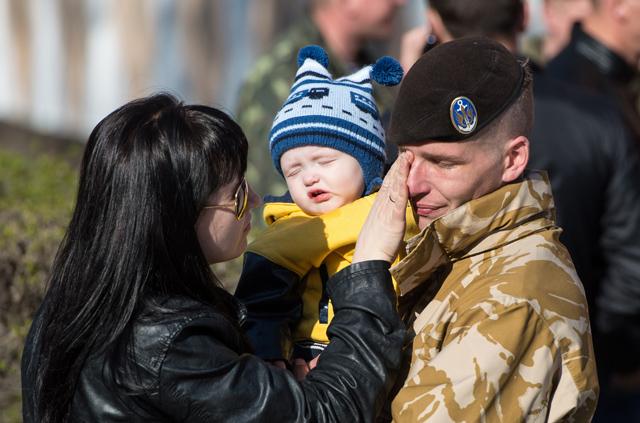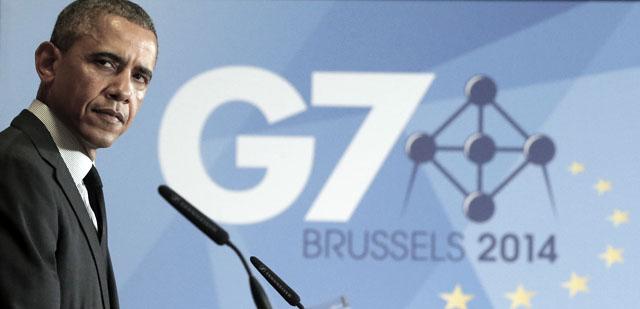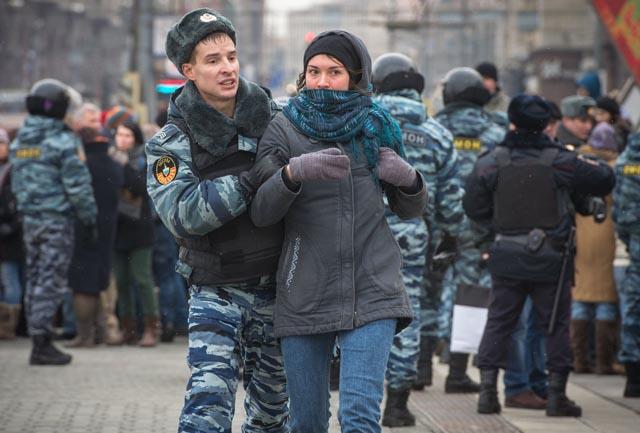You are here
Obama, G-7 leaders meet without Russia as Ukraine exits Crimea
By Reuters - Mar 24,2014 - Last updated at Mar 24,2014

THE HAGUE/FEODOSIA, Crimea — US President Barack Obama conferred with major industrialised allies in the Group of Seven (G-7) on Monday on how to pressure Russia over its seizure of Crimea after Ukraine told its remaining troops to leave the region for their own safety.
Obama, who has imposed tougher sanctions on Moscow than European leaders over its takeover of the Black Sea peninsula, sought backing for his firm line at a meeting deliberately called to exclude Russia, which joined in 1998 to form the G-8.
“As long as the political environment for the G-8 is not at hand, as is the case at the moment, there is no G-8 — neither as a concrete summit meeting or even as a format for meetings,” German Chancellor Angela Merkel said before the talks.
She said she did not expect the hour-long session of leaders of the United States, Japan, Canada, Germany, France, Britain and Italy, plus the European Union, to decide on new sanctions, although the leaders would discuss possible further measures to be taken if the situation escalates.
Since the emergency meeting held on the sidelines of a nuclear security summit in The Hague was announced last week, President Vladimir Putin has signed laws completing Russia’s annexation of the region.
Russian troops forced their way into a Ukrainian marine base in the port of Feodosia early on Monday, overrunning one of the last remaining symbols of resistance.
In Kiev, acting president Oleksander Turchinov told parliament the remaining Ukrainian troops and their families would be pulled out of the region in the face of “threats to the lives and health of our service personnel”.
That effectively ends any Ukrainian resistance, less than a month since Putin claimed Russia’s right to intervene militarily on its neighbour’s territory.
White House officials accompanying Obama expressed concern on Monday at what they said was a Russian troop buildup near Ukraine and warned that any further military intervention would trigger wider sanctions than the measures taken so far.
Russia-Ukraine talks
In what has become the biggest East-West confrontation since the Cold War, the United States and the European Union have imposed visa bans and asset freezes on some of Putin’s closest political and business allies. But they have held back so far from measures designed to hit Russia’s wider economy.
“Europe and America are united in our support of the Ukrainian government and the Ukrainian people,” Obama said after a meeting with Dutch Prime Minister Mark Rutte. “We’re united in imposing a cost on Russia for its actions so far.”
He also discussed the crisis at a meeting in The Hague with Chinese President Xi Jinping, who has voiced support for Ukraine’s sovereignty but refrained from criticising Russia. The West wants Beijing’s diplomatic support in an effort to restrain Putin.
Moscow formally annexed Crimea on March 21, five days after newly-installed pro-Moscow regional leaders held a referendum that yielded an overwhelming vote to join Russia. Kiev and the West denounced the annexation as illegal.
In one sign of a possible easing of tension, Russian Foreign Minister Sergei Lavrov agreed to hold a first meeting with his Ukrainian counterpart, Andriy Deshchytsya on the sidelines of the nuclear security summit, a Russian diplomatic source said.
The first 50 out of 100 observers dispatched by the pan-European OSCE security watchdog arrived in Ukraine on Monday to monitor potential trouble spots and report back to the 54-nation organisation. Russia relented late last week and agreed on a mandate after prolonged wrangling, but the monitors will not be allowed to enter Crimea.
Further costs
Western officials are now focused less on persuading Putin to relinquish Crimea — a goal that seems beyond reach — than on deterring him from seizing other parts of Ukraine.
White House Deputy National Security Adviser Ben Rhodes told reporters Obama hoped the G-7 leaders would foreshadow “what economic sanctions Russia would be faced with if it continues down this road”.
Another G-7 official said the main point of the G-7 meeting was “to show the isolation of Putin”. The leaders were also expected to cancel plans for a G-8 meeting at the Russian Olympics site in Sochi, for which preparations were frozen after Moscow seized Crimea, he said.
Persuading Europeans to sign on to tougher sanctions could be difficult for Obama. The EU does 10 times as much trade with Russia as the United States, and is the biggest customer for Russian oil and gas. The EU’s 28 members include countries with widely varying relationships to Moscow.
Central and east European countries that were once under Moscow’s domination and have joined the EU in the last decade are mostly urging caution due to the risk to their economies.
But German Chancellor Angela Merkel, the EU’s most powerful leader, has taken a tough line with Putin and supported EU moves to reduce the bloc’s long-term dependence on Russian energy.
Little resistance
The seizure of Crimea has been largely bloodless, apart from one Ukrainian soldier and one pro-Moscow militia member killed in a shoot-out last Tuesday. Ukraine’s troops left behind in Crimea have been besieged inside bases while offering little resistance.
In Feodosia, Ukrainian troops hugged each other in farewell after their base was overrun. Some chanted “Hurra! Hurra!” in defiance. One marine in full uniform who declined to identify himself wept and blamed the government in Kiev for the chaotic end to the stand-off.
“Yesterday we had an agreement: we would lower our flag and the Russians would raise theirs. And this morning the Russians attacked, firing live ammunition. We had no weapons. We did not fire a round,” said one marine, Ruslan, who was with his wife Katya and nine-month-old son.
Although Russian forces have not entered other parts of Ukraine, NATO says they have built up at the border. The Western military alliance also fears Putin may have designs on a part of another former Soviet republic, Moldova.
Despite the disruption to East-West relations, Washington wants other diplomatic business with Moscow to continue.
US Secretary of State John Kerry also held talks with Russian counterpart Sergei Lavrov, after meeting the head of the Organisation for the Prohibition of Chemical Weapons. The OPCW is overseeing the destruction of Syria’s toxic stockpile in action sponsored jointly by Washington and Moscow.
Russia hit back symbolically at Canada, announcing personal sanctions against 13 Canadian officials in retaliation for Ottawa’s role in Western sanctions so far. It has already taken similar measures against senior US Congress members but not yet European officials.
Western governments are struggling to find a balance between putting pressure on Putin, protecting their own economies and avoiding triggering a vicious cycle of sanctions and reprisals.
Rutte, who is making his residence available to Obama and the other G-7 leaders for the talks on the sidelines of a nuclear security summit, said the West might want to move slowly.
“Russia has an economy that is highly focused on oil and gas,” Rutte told Reuters. “If it came to putting in place sanctions, that would hurt Russia considerably. So in my view we should do everything to prevent that.”
US officials say any further sanctions will need to be carefully calibrated to avoid bans on entire sectors, such as oil or metals, that could affect the global economy.
Related Articles
The United States and its allies used the first Group of Seven (G-7) meeting without Russia in 17 years to condemn Moscow’s actions in Ukraine and threaten hard-hitting sanctions if President Vladimir Putin does not help restore stability.
(G-7) warned Wednesday against Russia’s “annexation” of Crimea as the Ukrainian premier prepared to seek US President Barack Obama’s help against the Kremlin’s expansionist threat.
Ukraine warned Sunday it was on the brink of disaster and called up military reservists after Russia’s threat to invade its Western-leaning neighbour risked sparking the worst crisis since the Cold War.














